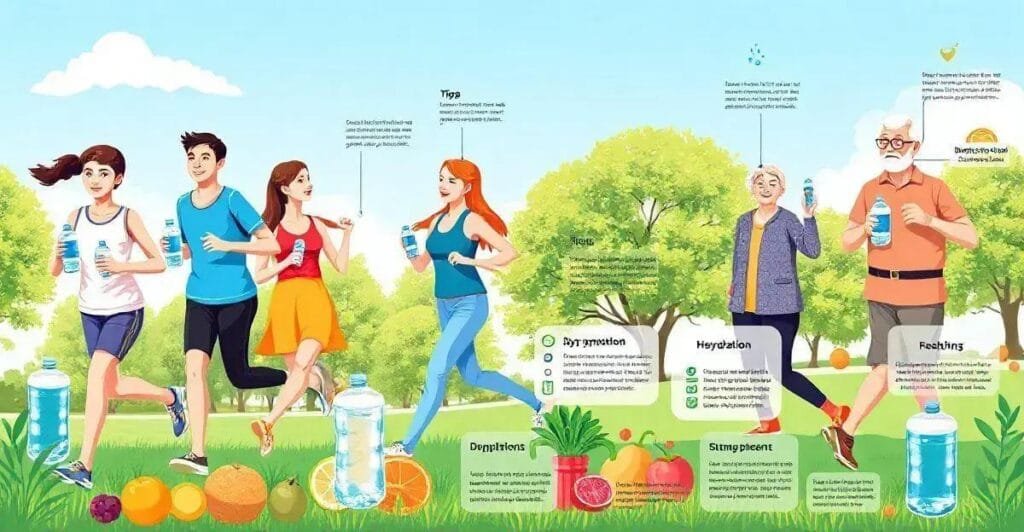As we navigate our busy lives, it’s easy to forget the importance of hydration.
But did you know that even mild dehydration can cause fatigue, headaches, and decreased productivity?
In this article, we’ll dive into the world of hydration and explore its impact on our body, the benefits of proper hydration, and how to stay hydrated in different situations.
Hydration and its Impact on Our Body
The human body is comprised of approximately 60% water, which plays a crucial role in maintaining its various functions.
Hydration affects every cell, tissue, and organ, and its impact can be seen in the regulation of body temperature, transport of nutrients, and removal of waste products.
Even mild dehydration can cause fatigue, headaches, and decreased cognitive function, making it essential to maintain proper hydration levels throughout the day.
Furthermore, hydration has been linked to improved athletic performance, faster recovery, and enhanced overall health.
With the importance of hydration in mind, it’s essential to understand how to maintain optimal hydration levels and what factors can affect hydration status.
The Benefits of Proper Hydration

Proper hydration has numerous benefits for the body, from improving physical performance to enhancing cognitive function.
Drinking enough water can help to regulate body temperature, transport nutrients and oxygen to cells, and remove waste products.
Additionally, hydration has been linked to improved digestion, reduced risk of certain diseases, and even weight loss.
Furthermore, drinking water has been shown to improve mood, reduce headaches, and increase energy levels.
With so many benefits, it’s essential to prioritize proper hydration and make it a part of daily routine.
By doing so, individuals can improve their overall health and wellbeing, and feel more confident and focused throughout the day.
Dehydration Symptoms and Prevention
Dehydration can cause a range of symptoms, from mild discomfort to severe and even life-threatening conditions.
Mild dehydration may cause headaches, fatigue, and dry mouth, while moderate dehydration can lead to dizziness, nausea, and dark urine.
Severe dehydration, however, can result in seizures, coma, and even death.
To prevent dehydration, it’s essential to drink plenty of water throughout the day, especially in hot weather, during exercise, and in high-altitude environments.
Additionally, individuals should be aware of the signs and symptoms of dehydration and seek medical attention if they experience severe dehydration or other concerning symptoms.
Furthermore, making hydration a habit can help to reduce the risk of dehydration and improve overall health and wellbeing.
Hydration for Different Activities

Hydration plays a crucial role in various activities, from sports and exercise to work and daily life.
Athletes, for example, need to replenish lost fluids to maintain optimal performance and reduce the risk of dehydration.
Similarly, individuals who work outdoors or in hot environments require proper hydration to avoid heat exhaustion and heat stroke.
Additionally, individuals who engage in activities that require intense mental focus, such as gaming or coding, may benefit from hydration to improve focus and productivity.
Furthermore, hydration is essential for individuals who engage in activities that require physical labor, such as construction or manufacturing, to maintain energy levels and prevent fatigue.
By prioritizing hydration, individuals can improve their overall performance and reduce the risk of injury or illness.
Hydration for Children and the Elderly
Hydration is especially important for children and the elderly, as they may be more susceptible to dehydration due to their age or health status.
Children, for example, may not be able to communicate their thirst or may not be aware of the signs of dehydration.
Elderly individuals may have decreased thirst sensation or may have underlying medical conditions that increase their risk of dehydration.
To ensure proper hydration, parents and caregivers should monitor their children’s fluid intake and provide regular opportunities for water consumption.
Similarly, healthcare providers should educate elderly individuals on the importance of hydration and provide them with guidance on how to maintain proper hydration.
By prioritizing hydration, children and the elderly can reduce their risk of dehydration and maintain their overall health and wellbeing.
Conclusion: The Importance of Hydration

In conclusion, hydration plays a crucial role in maintaining our overall health and wellbeing. From improving physical performance to preventing dehydration, hydration is essential for our bodies to function properly.
By prioritizing hydration and making it a part of our daily routine, we can improve our overall health, reduce the risk of dehydration, and maintain optimal physical and mental performance.
Frequently Asked Questions about Hydration
What are the benefits of proper hydration?
Proper hydration can improve physical performance, reduce the risk of dehydration, and maintain optimal physical and mental performance.
What are the symptoms of dehydration?
The symptoms of dehydration can include headaches, fatigue, dry mouth, and dark urine.
How can I prevent dehydration?
You can prevent dehydration by drinking plenty of water throughout the day, especially in hot weather, during exercise, and in high-altitude environments.
Is hydration important for children and the elderly?
Yes, hydration is especially important for children and the elderly, as they may be more susceptible to dehydration due to their age or health status.
Why is hydration important for overall health?
Hydration is important for overall health because it helps maintain proper bodily functions, such as regulating body temperature, transporting nutrients and oxygen to cells, and removing waste products.


